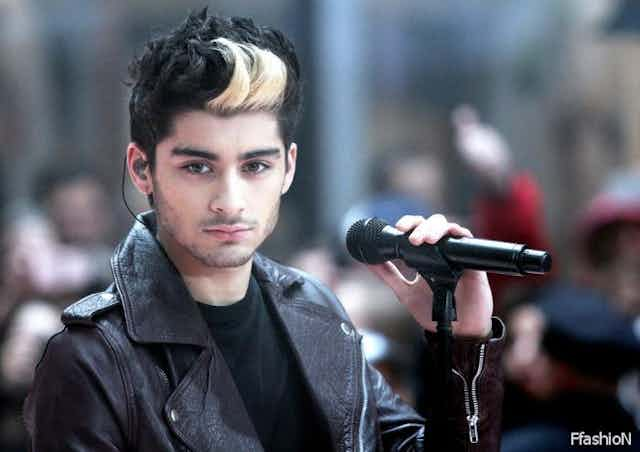Recently, it was announced that Zayn Malik (formerly of One Direction) is going to publish a memoir. Guardian Music noted this was his “first autobiography”, implying that one autobiography will not be enough. At 23-years-old, it suggested, it’s not yet time for the singer to start looking back on his life in print. I’m not so sure.
Miley Cyrus was also mocked when she published her autobiography, Miles to Go, when she was only 16, as was Ronan Keating, who published his in 2001, aged 24 (a few years ago, Keating claimed to regret doing so, calling the memoir “premature”).
Embedded in such criticism is a fairly traditional understanding of memoir – a word which may call to mind an elder statesman reflecting on a life of public achievement.
Fair enough – this is the figure who typically published their memoirs until the 20th century. But such an understanding leads to questionable assumptions – that to have a life story worth telling, you need to be first an adult, second, male, and third, preferably a public figure. Today, it’s widely accepted that the rules have relaxed (we’ve got a whole range of factors such as civil rights, postmodernism and social media to thank for this). Anyone – theoretically – can have a voice, a platform, a story worth telling.
Except young people, it seems. Accusations of publishing memoirs “too young” usually assume that with age comes maturity and the ability to better reflect on the past. That’s like saying it is always better to look at something from a distance, when there are clearly times when it’s best to look at things close up – after all, some memories dim, or disappear, the older we get. When it comes to memoirs, we need the distant and the close up view: not just for variety, but because young authors’ viewpoints have their own strengths.
It’s worth noting that Malik, Cyrus, Keating and others are mocked not simply due to their age. Many responses to these young celebrities suggest that the act of writing memoir confers a dignity on their professions which it does not deserve. That’s despite the fact that celebrity memoirs by adults, for adults, are enduringly popular. Readers enjoy learning about the obstacles individuals overcome in order to achieve success – and, in Malik and Cyrus’s case, the ins and outs of the “star-making machine”. Readers like to know more about people they admire or are simply interested in – so why are Cyrus or Malik any different, just because they’re younger?
One of the best-selling memoirs (actually, books) of all time is The Diary of Anne Frank, written by a girl who later died in a concentration camp at the age of 16. Nobody says Frank’s memoir isn’t valid because of her youth – in fact the book is all the more moving because of her age. If an individual is judged to have led a life of significance, suddenly age doesn’t matter. But who decides what counts as “significance”?
Here are some further examples of important autobiographies by young authors:
1) The girl who loved school
Malala Yousafzai was 17 when her autobiography, I am Malala: The Girl Who Stood Up for Education and was Shot by the Taliban, was published in 2014. She uses her public platform to advocate for social and political change (particularly in relation to girls’ education). There is a long history of using memoir for such purposes.

2) Scarred childhood
The Anne Frank-inspired Zlata’s Diary (1995), documents the life of Zlata Filipovic, a young girl living during war in Sarajevo in the 1990s. Zlata started compiling a journal when she was ten. Like Frank’s diary, it is considered inspiring because of its documentation of attempts to live childhood in circumstances which threaten innocence.
If you’re detecting a pattern of iconic young women autobiographers who tell stories of life in traumatic circumstances, you’d be right.
3) Boy soldier
Ishmael Beah’s autobiography was written when he was 25. A Long Way Gone: Memoirs of a Boy Soldier (2008), recounts his experiences as a child soldier in Sierra Leone. Like many autobiographies by young writers, this can be understood as a trauma narrative, in which the act of writing enables the writer to confront the past.

4) Civil rights and wrongs
In her widely acclaimed memoir, Coming of Age in Mississippi (1968), Anne Moody describes growing up in an African-American family in the American south, and her activist work in the civil rights movement. She was 28 when this was published.
5) Youth in the trenches
Goodbye to all That (1958) by Robert Graves focuses especially on the author’s experiences as a soldier in his twenties, in World War I. As he was 34 when this book was published, you may question his inclusion in this list, but he raises the question of what we mean by “young” and the arbitrariness of deciding who is too young.
Like all the titles listed here, Graves’s memoir is an important act of witness and aims to educate audiences who had not shared its authors’ experiences. These examples make the point that young autobiographers do have important, well-told stories to tell. There is, after all, no consensus that upon reaching a particular age, writing a memoir is suddenly justified.
On the BBC, it was recently reported that Britain’s former chancellor, George Osborne, claimed he wasn’t ready to write his memoir because he wasn’t sure how his story would end (he’s 45). Osborne’s attitude reflects additional popular, if often-challenged ideas – that memoirs must recount the sum total of a life and are therefore produced towards its close.
Perhaps this is the heart of the matter. Young autobiographers expose the fact that no memoir can capture the whole of a life. Their stories implicitly ask what lies, untold, in the future. And their works, written in what may appear to be “early” stages of career and self-discovery, prompt us to consider our own achievements.

